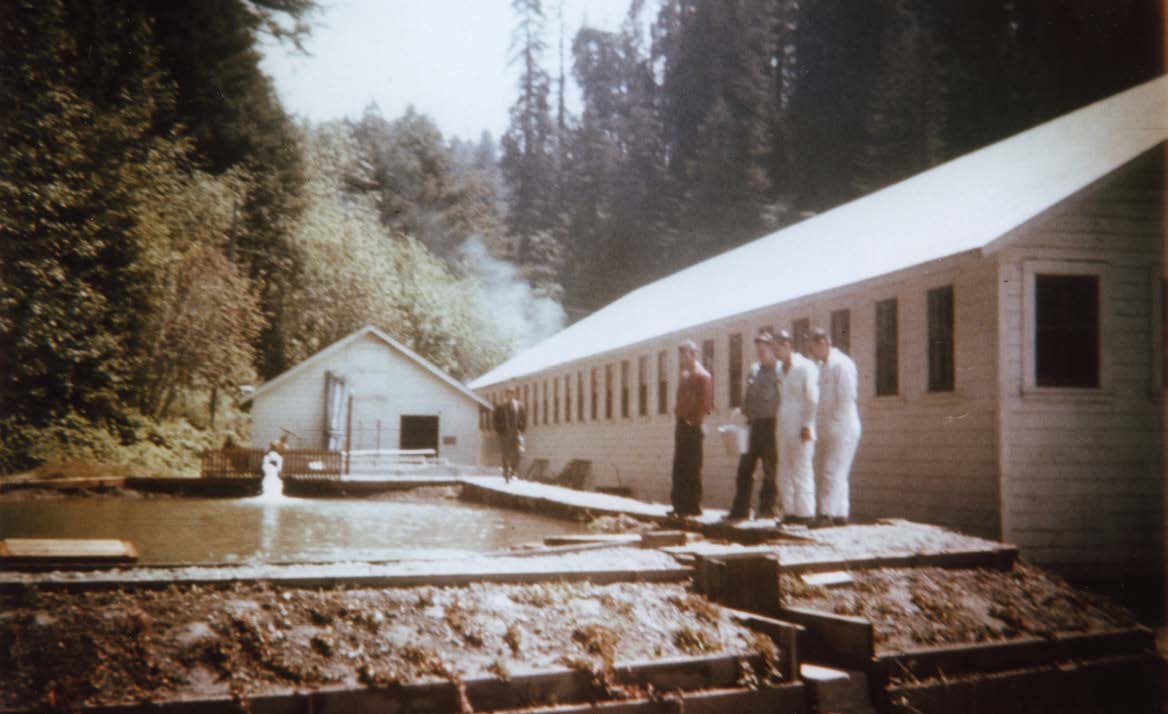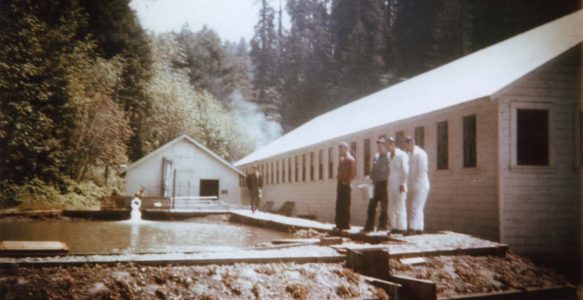Prairie Creek Fish Hatchery, CA 2024
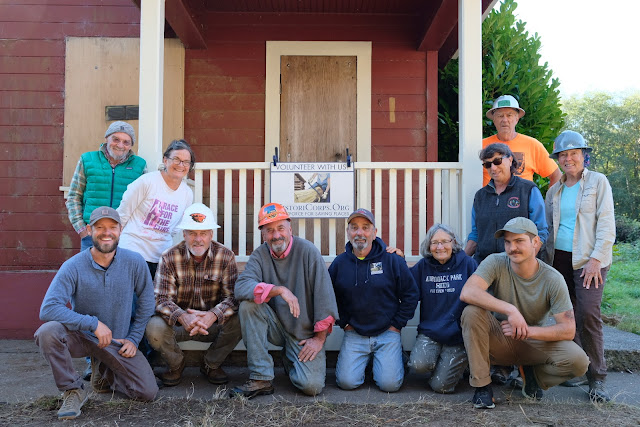
If you missed out in 2022, fear not, we’re heading back to the Prairie Creek Fish Hatchery! Come experience one of the last surviving landmarks from the early years of the California Department of Fish and Game.
PROJECT PARTNER: Redwood National Park
SESSION DATES: June 9-14, June 16-21, and June 23-28
PROJECT SUPERVISOR: Matt Entwistle!
CREW LEADER: Nicole Gruenig!
Project Site Description & History
The Prairie Creek Fish Hatchery near Orick was one of the first local hatcheries developed in California to improve sport and commercial fishing. Located on land historically and currently stewarded by the Yurok Tribe, it was constructed in 1936 by the Works Progress Administration (WPA) on the 62-acre site of a previous hatchery.
The WPA was formed as part of the Emergency Relief Appropriation Act of 1935, during the Great Depression. The program ultimately provided work to more than 8.5 million skilled and unskilled Americans in poverty. In the eight years of the program’s existence, WPA members completed 1.4 million public projects. At Prairie Creek, WPA members constructed hatchery ponds, five water tanks, a pipeline, superintendent’s house, assistant’s house, sidewalk, garage shop, and shed.
The hatchery is notable for its provision of housing for workers, dependence on simple yet effective technology that relied minimally on power, and for being funded primarily through fishing licenses and related fees. After 56 years in operation, the hatchery closed in 1992. The site is now listed on the National Register of Historic Places. Given that the hatchery closed operations only twenty years ago, many local residents still carry memories of visiting the site during their grade school field trips!
In 2022 HistoriCorps volunteers gave the buildings at Prairie Creek Fish Hatchery a fresh coat (or two) of paint, revamped collapsing porches, and fixed the siding on a number of the buildings. This year we’re headed back to improve various support structures and continue our work from last season on the remaining porches. If coastal California during peak season suits your schedule, then Prairie Creek Fish Hatchery might want to be on the top of your list.
Join us this summer in the mystical Red Wood Forests of Northern California and preserve a slice of California Department Fish and Game’s coveted history!
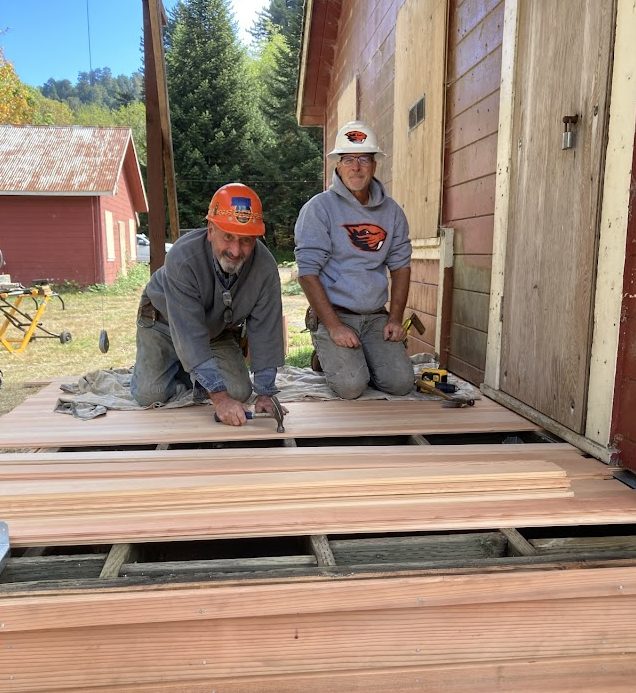
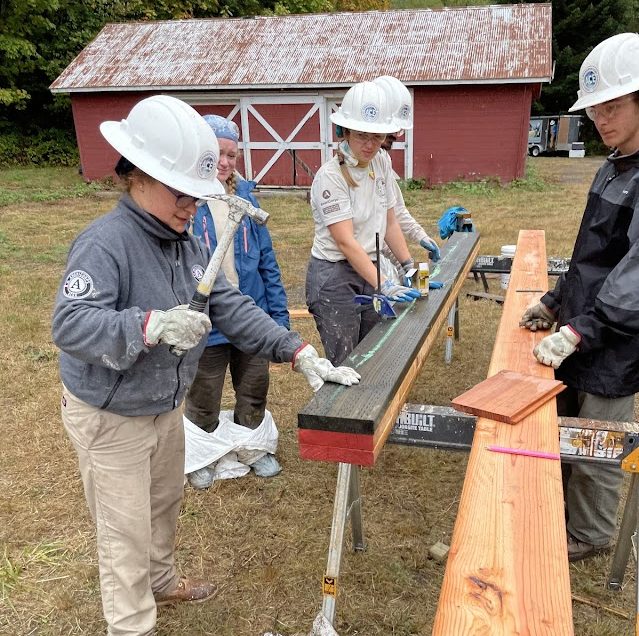
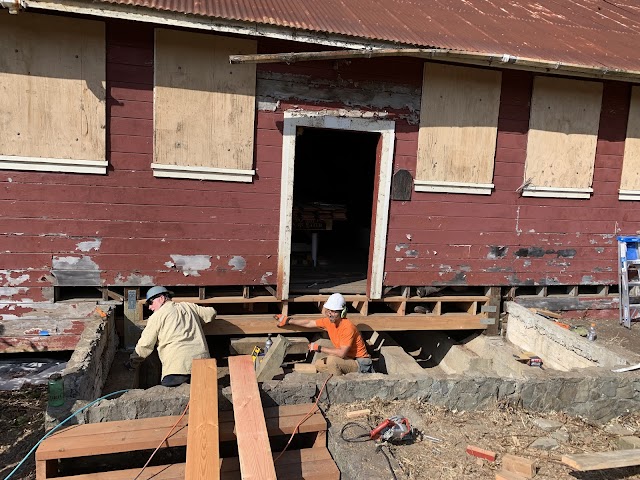
Location and Logistics
SESSION DATES: June 9-14, June 16-21, and June 23-28
Please plan to arrive at the campsite no earlier than 5pm and no later than 7pm on the first day of your session.
LOCATION: Located right off Highway 101 just north of Orick, CA!
MAP to PRAIRIE CREEK FISH HATCHERY
CAMPSITE INFORMATION:
![]()
![]()
![]()
![]()
![]()
![]()
Tents, truck campers, campervans, and small RVs or trailers are welcome at our campsite. Hookups will not be available. Our partner has requested for no dogs at this project.
WEATHER: Anticipate highs in the upper 70s and lows possibly in the 40s. Weather conditions may be rainy, cloudy, or sunny. Volunteers are responsible for checking weather conditions before their session begins, and packing appropriately.
ABOUT VOLUNTEERING: HistoriCorps projects are free for volunteers! HistoriCorps will provide all meals, tools, training, equipment, and a campsite. Volunteers are responsible for their own transportation to the campsite, sleeping equipment, work gloves, clothes and boots, and other personal gear.
Scope of Work
HistoriCorps is committed to educating and training volunteers in preservation skills, with an overarching mission of inspiring a preservation ethic in all those involved. Learning and working alongside expert HistoriCorps field staff, volunteers and applying the traditional skills necessary to restore the Prairie Creek Fish Hatchery:
- Support roof framing of porches.
- Deconstruct existing lower porch elements including rails, posts, flooring, framing, stairs, siding, etc.
- Reconstruct porch framing using salvaged materials
- Install new tongue and groove fir flooring
- Install new stairs
- Prime and paint porch
Please note: Tasks vary by day and by week, depending on a variety of factors including: weather, project priorities, previous groups’ work, and more. Though it is likely you will get to learn and practice most or all of the above tasks, it is not guaranteed. The higher percentage of the scope a particular task is, the more likely you will get to practice it.
Sign Up!
We’re thrilled this project has inspired you to volunteer!
CLICK HERE TO REGISTER!
Visit our Job Calendar to see spaces are available!
*All registrations submitted to projects at capacity will be automatically added to our waitlist.*
CANCELLATIONS effect our ability to complete projects. Please register only if you are certain about your ability to participate.
You will know your registration was successful when you receive a confirmation email. Contact volunteer@historicorps.org for assistance.
HistoriCorps does not charge for its volunteering projects. HistoriCorps relies on donations to continue engaging volunteers to save significant historical sites across America for generations to come. Your donation of any amount will make an incredible difference! Increase your impact – make a generous gift today.
Volunteer Logistics, Policies, and Advice
We’re so glad you’re interested in joining this project! If you’re new to our community, review the Volunteer FAQ first! Please note the following logistics and policies:
- Volunteering with HistoriCorps is free! We will provide all meals, tools, training, equipment, and a campsite or shared indoor lodging. Dinner is not provided on the first night.
- Volunteers are responsible for bringing their own gear, work gloves, sturdy work clothes and boots, and appropriate sleeping equipment. Check the average temperatures before you start packing – the nights and mornings may be colder than you anticipate! Then, read this advice about how to stay warm when tent camping in colder places.
- Campsite accessibility varies by project. Some projects can accommodate tents only; others can accommodate small RVs. Please review the project site description above for more information, and if you’re still not sure, email volunteer@historicorps.org for help.
- If this project does not offer showers, you might want to consider bringing a solar shower or research other methods to clean up after the work day.
- Volunteer crew sizes generally range from 4-8 volunteers, with two HistoriCorps staff that lead and train volunteers in the work.
- Safety is one of HistoriCorps’ top priorities, and volunteers can contribute to a safe working environment by ensuring their physical fitness is adequate for the work. See above for this project’s scope of work and difficulty level. Please, call us if you are not quite sure if a project is a good fit for your skills or fitness level. We may be able to suggest a project more suitable and enjoyable for you.
- Hard hats, eye protection, ear protection, gloves are standard personal protection equipment (PPE) required on all projects. Hard hats must be worn at all times on the project site, unless working in a designated safe space. Field staff will train volunteers on correct use of PPE.
- Dogs are generally allowed to accompany their humans in project campsites (actually, we love having dogs join us around the campfire!). Dogs are not permitted on the job site for everyone's safety. HOWEVER: HistoriCorps also follows the rules and regulations of our project partner. If the project partner does not permit dogs onsite then HistoriCorps is no exception. Please ask HistoriCorps or the project partner directly if you have any questions about whether Fido is welcome.

